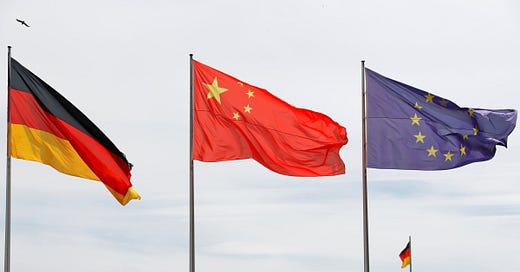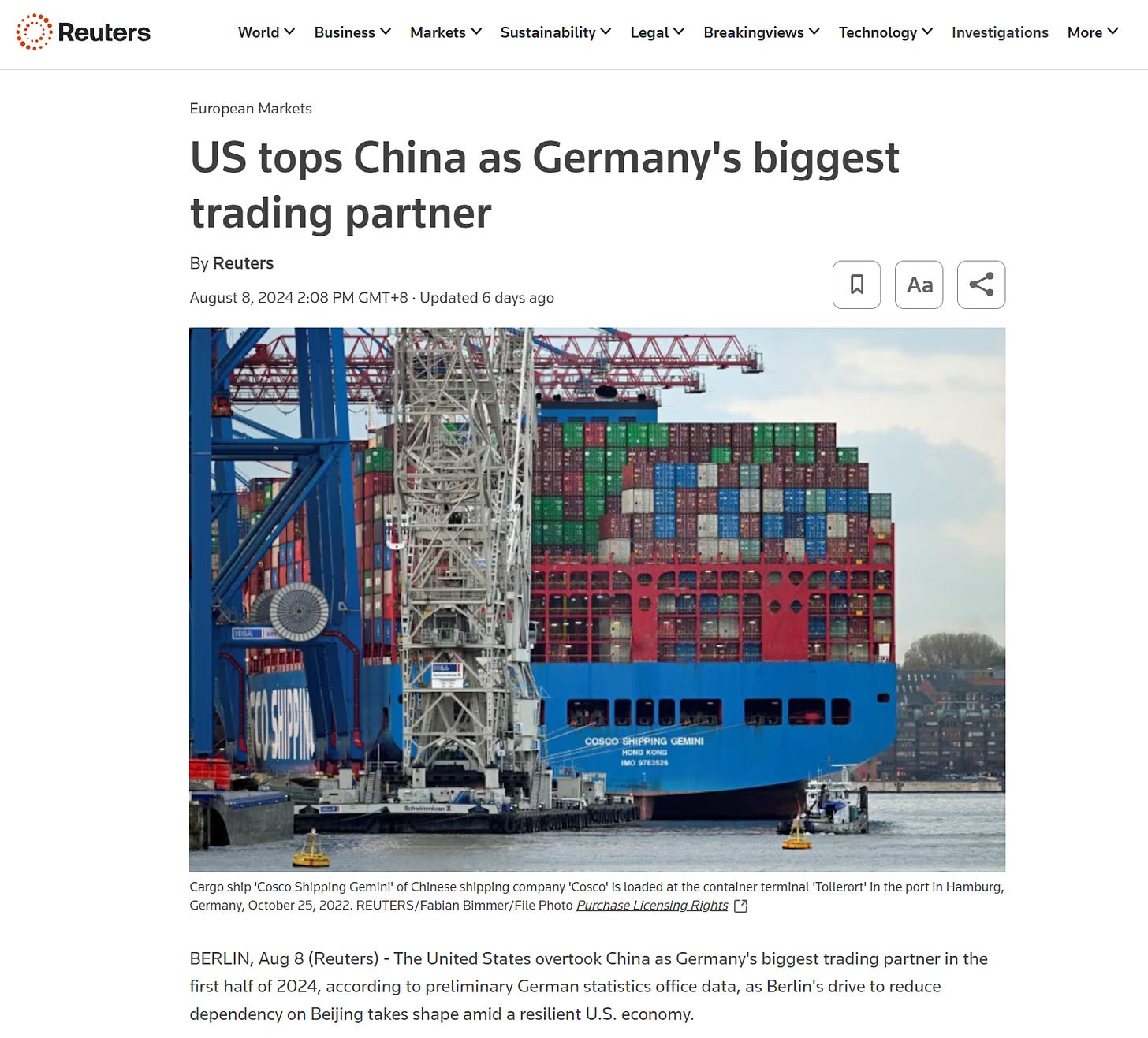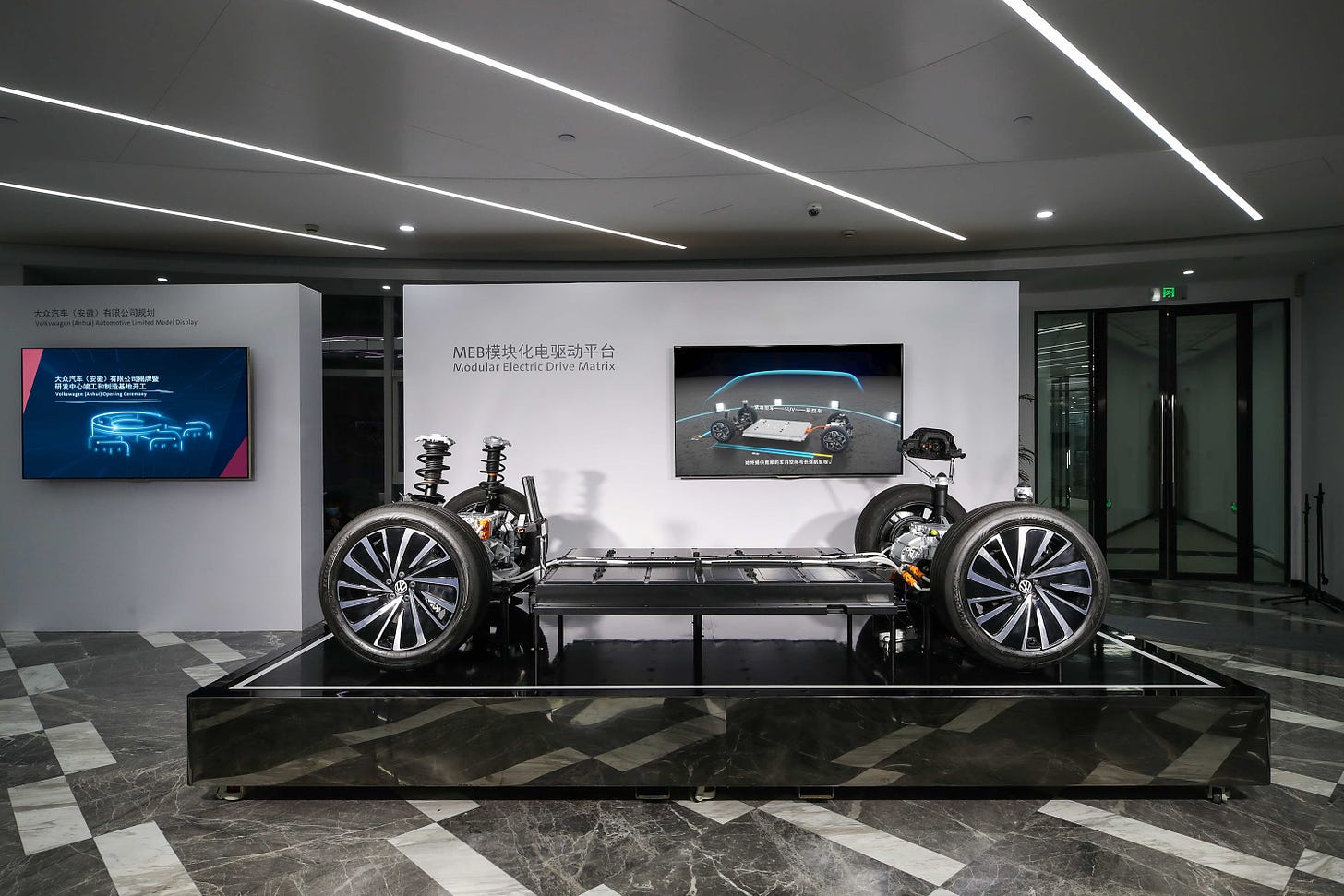Good evening. Today we would like to discuss "de-risking" (from China) with you. While this concept is not new, it came to our minds after we read a recent Reuters report. It highlighted that in the first half of this year, the United States became Germany's biggest trading partner, replacing China which held this position for the last eight years.
The trade between Germany and the United States totaled around 127 billion euros from January to June, while Germany-China trade amounted to just under 122 billion euros. The report said that the ongoing economic weakness in Germany, the reluctance of consumers, and also the desire for greater diversification of supply chains in the industry contributed to this result.
This news is not new: earlier this year, the United States has already overtaken China as the top trading partner of Germany in Q1 2024. The CNBC story quoted an analyst as saying that the "decoupling" (some actions taken under the banner of de-risking may lead to a form of decoupling) from China contributed to the new situation partly. It is not only about China and Germany's trade and economic relations. China-EU trade shows similar change.
The CNBC report also mentioned the German government's new China strategy which put forward a word that is quite popular now: de-risking (from China).
The concept of de-risking was first introduced by European Commission President Ursula von der Leyen in March 2023. She made a speech on EU-China relations in Brussels before leaving for Beijing for a visit. Von der Leyen called for reducing dependence on China and seeking diversification of supply chains. Later, "de-risking" became popular among many European and American politicians and was adopted by the G7 group in May 2023 in Hiroshima, Japan.
Of course, China always opposes such rhetoric. Foreign Minister Wang Yi said that China sees itself no risks but opportunities for Europe, and China-EU are partners, rather than rivalries. Decoupling with China is the real risk.
To find out whether the de-risking is taking effect on China-Germany (EU) economic and trade relations, we talked to two Chinese professors with specialties in Germany and the EU, in politics and economics, respectively.
They are 伍慧萍 Prof. WU Huiping, from Shanghai-based Tongji University. She is Vice Rector of the German Research Center and Head of the German Faculty and Vice Director of the Shanghai Institute for European Studies (SIES), and 史世伟 Prof. SHI Shiwei, Professor of international economics at the Beijing-based University of International Business and Economics (UIBE), and senior research fellow at the Research Center For China―EU Economic Cooperation.
In summary, Prof. WU believes that de-risking is beginning to affect China-Germany (EU) economic relations and is also having repercussions on Germany and the EU, both of which rely heavily on foreign trade as export-oriented economies. It's concerning that "de-risking" is now extending beyond political and security areas to also impact science, education, and cultural cooperation
Prof. SHI noted that another reason for U.S.-Germany trade surpassing China-Germany trade is the advancement of industries in China, particularly in areas like automation, mechanical manufacturing, and the automotive sector. These developments are enabling Chinese companies to reclaim market share previously held by foreign firms, leading to a reduction in China's imports from Germany and the EU compared to the past.
伍慧萍 Prof. WU Huiping, from Shanghai-based Tongji University. She is Vice Rector of the German Research Center and Head of the German Faculty and Vice Director of the Shanghai Institute for European Studies (SIES)
The following are Prof. WU viewpoints:
1. The news (the United States replacing China as Germany's top trading partner) is not surprising. The strategy has allowed the United States to reap benefits as some German companies are turning to the United States, and Washington has introduced the Inflation Reduction Act (IRA) to give huge amounts of subsidies to private sectors and attract foreign investment.
2. To some extent, this situation shows that the strategy of "de-risking from China" advocated by the German government is taking effect. Under the guidance and requirements of the German government, the business community has reduced its dependence on China. German companies in China used to pursue a strategy of “in China for the world”, but now some of them are shifting to “in China for China,” localizing their supply chains to reduce risks, while investing in other countries to build alternative facilities.
3. “De-risking” also resulted in some burdens, uncertainties and new risks for German companies when they turned to Southeast Asia, India and other markets. Those countries have large populations, large numbers of middle-class people, and labor prices are lower than those of China. However, their education and training levels cannot be compared with Chinese workers, not to mention infrastructure and supporting facilities. In a larger sense, the de-risking strategy is backfiring on Germany's macroeconomy.
4. As the largest economy in the EU, Germany’s new development is quite representative and reflects the general trend in the EU. We have seen that many EU countries except Hungary, are following de-risking strategy. This trend is very alarming: Germany and the EU are strengthening trade protectionism, raising normal economic and trade and commercial behaviors to political and security risks.
In addition to photovoltaics, Chinese telecom devices are being phased out from Germany's network system. Germany has become more cautious in the field of scientific research when cooperating with China. The de-risking strategy is expanding from the economic and trade field to the field of scientific and technological cooperation. It is worth being vigilant. It's unfavorable to the export-oriented economy and undermines the spirit of free trade that Germany and the EU have benefited from for decades.
Before we move to the second expert's opinions, we want to show you some more information. First, about China's foreign trade data. According to China's General Administration of Customs (GAC), China's foreign trade hit a new high in the first seven months of this year. The goods trade volume expanded 6.2 percent year on year in yuan terms in the first seven months. Exports rose 6.7 percent year on year, while imports climbed 5.4 percent.
ASEAN remained China's largest trading partner, with bilateral trade volume reaching 3.92 trillion yuan in the first seven months, up 10.5 percent from a year ago, accounting for 15.8 percent of the country's total foreign trade. It was followed by the EU with trade volume standing at 3.22 trillion yuan, the United States at 2.72 trillion yuan, and South Korea at 1.32 trillion yuan.
Second, although some German companies are localizing their supply chains in China, auto giant Volkswagen and some other leading companies are doubling down and integrating supply chains in China and overseas. Volkswagen Anhui's first product exported to the European market, which is Cupra Tavascan, officially began mass production at the end of 2023. BMW's fully electric SUV iX3 is also made in China's Liaoning Province and exported overseas.
史世伟 Prof. HI Shiwei, Professor of international economics at the Beijing-based University of International Business and Economics (UIBE), and senior research fellow at the Research Center For China―EU Economic Cooperation. He is also an adjunct professor at Berlin-based bbw University of Applied Sciences (bbw Hochschule).
The following are Prof. SHI's views:
1. In principle, within political and business circles there is a consensus to reduce over-dependence on China, but how to do it is controversial. Germany and the EU have strengthened reviews of trade involving China, and prohibited dual-use items from being exported to China. Now the EU wants to set limits on foreign investment in China, which was quite rare before. Sectors include chips and others, for fear of technology outflow. These actions have all been coordinated with the United States.
2. Another reason for changing China-Germany trade relations is upgrading and progressing in China's industry. China is doing quite well in automation, and artificial intelligence (AI), not to mention new energy vehicles. Many customers are turning to EVs of Chinese brands rather than the traditional fuel vehicles of BMW, Mercedes and other luxury German brands (Germany's auto industry suffers from weakness in the Chinese market). China is making rapid progress in those sectors and is taking back the market share that foreign companies once occupied. Therefore, China reduced imports from Germany, while Germany's imports from China saw no major changes.
It's similar to China-EU trade relations, with China's trade surplus in goods with the EU shrinking by 106 billion euros in 2023 compared with the previous year, a 27 percent decrease.
3. I'm optimistic about the future of China-EU economic relations. Despite changes in the global geopolitical landscape, the fundamental economic structure remains unchanged, with the EU and Germany still heavily dependent on foreign trade as export-oriented economies. They are unlikely to abandon the Chinese market.
Another reason for my optimism is the uncertainty surrounding the United States. If Donald Trump becomes the next U.S. President, trade protectionism could resurface. Europe hasn't forgotten the strained trans-Atlantic relations in almost all aspects during his last administration. Regardless of who wins the upcoming Presidential elections, the U.S. strategy of re-industrialization will continue, which could impact European interests.














One factor missing for me in this analysis - an important one, because it reinforces the de-risking strategy - is the loss of trust in China in many European countries because of China‘s continuous economic support of Russia. The war in Ukraine is not something peripheral for the EU but touches upon its core interest of stability and security in Europe. Preventing that European technology ends up via China in dual use goods used by Russia to attack Ukraine is a very big topic. Therefore, I would expect further restrictions in the future if China‘s Russia policy stays on the current course.